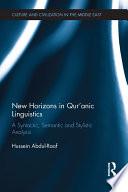
A Brief Introduction to Qur'anic Exegesis
Generating precise comprehension of the Quran and the true meaning of its verses is arguably the essence of the most important of the Islamic sciences, Qur’anic exegesis or tafsÏr. Since the passing of the Prophet many scholars have worked hard to bring a proper understanding of the meaning of the Qur’an to Muslims, and indeed to the world at large, as fully as possible, in an attempt to widen knowledge of the guidance contained therein, and how to live life in accordance with its principles. The result has been a wealth of historical Muslim literature on the subject which has come to be known as Ulum al-Tafsir or the sciences of tafsir, a systematic exegesis of the Qur’an following several methodologies. This work traces the evolution of Qur’anic exegesis, from the time of the Prophet, the Companions, the Successors, the early mufassirun (exegetes) with independent tafsir works, to the present day. In doing so, it addresses some major issues including to what extent has tafsir been influenced by differing theological traditions (classical, mystical sufi, persian), political and sectarian interests etc. and how interpretation has differed in some cases, mainly pertaining to juridical, theological, historical, and linguistic issues. Certain scholars and Qur’anic commentaries have stood the test of time and stand in greater prominence to others. Their works are introduced, and different methodologies compared and critiqued. What we are left with is a broad yet important overview of a subject which otherwise can be too complex and extensive for the ordinary reader to grasp acting as a valuable addition to his/her understanding and study of the Qur’anic text.
- ISBN 13 : 1565646886
- ISBN 10 : 9781565646889
- Judul : A Brief Introduction to Qur'anic Exegesis
- Pengarang : Ali Suleiman Ali, Ali Suleiman Ali,
- Penerbit : International Institute of Islamic Thought (IIIT)
- Bahasa : en
- Tahun : 2017
- Halaman : 187
- Google Book : https://play.google.com/store/books/details?id=-cdZDgAAQBAJ&source=gbs_api
-
Ketersediaan :
This work traces the evolution of Qur’anic exegesis, from the time of the Prophet, the Companions, the Successors, the early mufassirun (exegetes) with independent tafsir works, to the present day.









